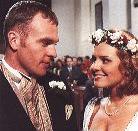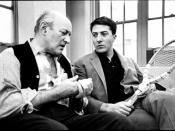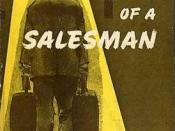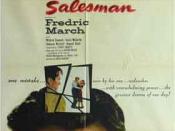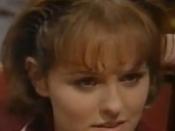In the play "Death of a Salesman" there are many character that were compared to the difference between success and failure within the system. Willy and Linda are the tragic hero and heroine, but their tragedies are totally different from each other. Willy is the dreamy salesman whose imagination is much larger than his sales ability, while Linda, Willy's wife stands by her husband even in his absence of realism. From the beginning, Willy tries to persuade himself and others that he and his sons are successful, but in the end, Willy is unable to live up to his own expectations. On the other hand, Linda serves as the enabler for Willy to live in his fantasy world. She tries to protect Willy from the harsh reality of their lives because she finds it too hard to find the causes of his problems.
Willy is a salesman who can't accept reality and who he is.
He is a troubled and misguided man who dreams of becoming successful but fails in the end. As Willy grows older, he has trouble seeing between the past and present, between illusion and reality and is often lost in between flashbacks of his life where much of the story is told. These flashbacks are generally during the summer after Biff's senior year of high school, when all of the family problems started. Willy hopes to strike it rich in the business world of New England. Yet, he never finds the diamond meanings of success and happiness when his older brother Ben tells Willy, "The jungle is dark but full of diamonds." as he leaves life without fortune or fame. When explaining to his wife why they can't leave the crowded city to live in New York, Willy tells his wife, "I'm the New England man. I'm vital in New England." Unfortunately for Willy, this is just an illusion. Willy's sons Biff and Happy are also failures, but Willy doesn't want to believe this. He wants his sons especially Biff, to succeed where he has not. He believes his boys are great and cannot understand why they are not successful. Willy's attitude toward Biff is complex, but on the other hand there is a strong personal attachment, which is he wants Biff to love him. He remembers yearningly the fondness shown for him by Biff as a boy, and he still wants this. On the other hand, Willy also is emotionally involved with Biff because his son's success or failure is also his. By becoming rich and influential, the handsome, personable Biff was slated to provide Willy's victorious reply to all not plentifully impress with his own modest advancement. Though Biff has done nothing with his life by the age of thirty-four, Willy tells others and tries to make himself believe that his son is doing "big things" out west. In the prime of Willy's life, he to a great amount is an unauthentic man whose dreams exceed his limited hold. Now as he prepares for his final failures where he is no longer a young and vital man, he can only blame himself for not becoming what he wanted to be.
Linda is the eternal wife and mother, the fixed point of passion both given and received, the woman who suffers and persists, and in many ways the earth mother who takes in the play's final right value, love. But in the beautiful complexity of her creation, she is also Willy's and her sons' destroyer. Somehow she's the one who has the power to take the rights of peace in the family. She is always trying to stand between Willy and her sons to reduce the stresses of failure. She encourages Willy to dream, yet she will not let him leave her for the New Continent, the only domain where the dream can be fulfilled. She is protective of Willy for she knows that Willy is tired and is a man at the end of his life. She wants him to be happy even though in reality the situation is bad. Linda knows that Willy has been trying to commit suicide, but does not step in because she does not want to embarrass him. She lets it continue because she is not one to cause trouble and she is also not part of the solution. Rather, she is part of the problem, which is failing to serve an adjective purpose to a family whose problem is their inability to see things for what they really are.
At some points, Willy and Linda were both imaginative, Willy believes he is a successful husband and father, as Linda believes that she is doing a wonderful job and running a good family. All in all, Willy is little more than a failure and a crazed lunatic living in the past. Though Linda, Biff and Happy are all unable to separate reality from illusion to some degree, Willy is the main character who suffers from this physical disorder. Though he's a disrespected salesman, he calls himself the "New England man." Linda, in contrast, displays little of the wild intensity of Willy. Rather, she is dependable and kind, endlessly trying to smooth out conflicts that Willy might meet. Linda has a similar longing for an idealized past, but has learned to hold back her dreams and her dissatisfaction with her husband and sons.
In conclusion you can never really live life in imagination for in the end it will always be worse then reality. People live in imagination to escape problems and hardships of life. There is only one flaw to this though, that flaw is that when you spent your whole life in an imaginary world you keep all the hardships and problems inside. When one day you finally see that you don't live in that sweet imaginary world all those problems and hardship come out and you finally breakdown. For example, Willy tries to commit suicide because at points of his life he sees that his life isn't glamorous or successful but full of failure. Rather then trying to hide and run away from your failures you should try to confront them and turn them into successes. For the outcome of trying and failing is still a lot greater than the outcome of failing and running away from it. God gave everyone in life the ability to succeed; all we have to do is find how.
